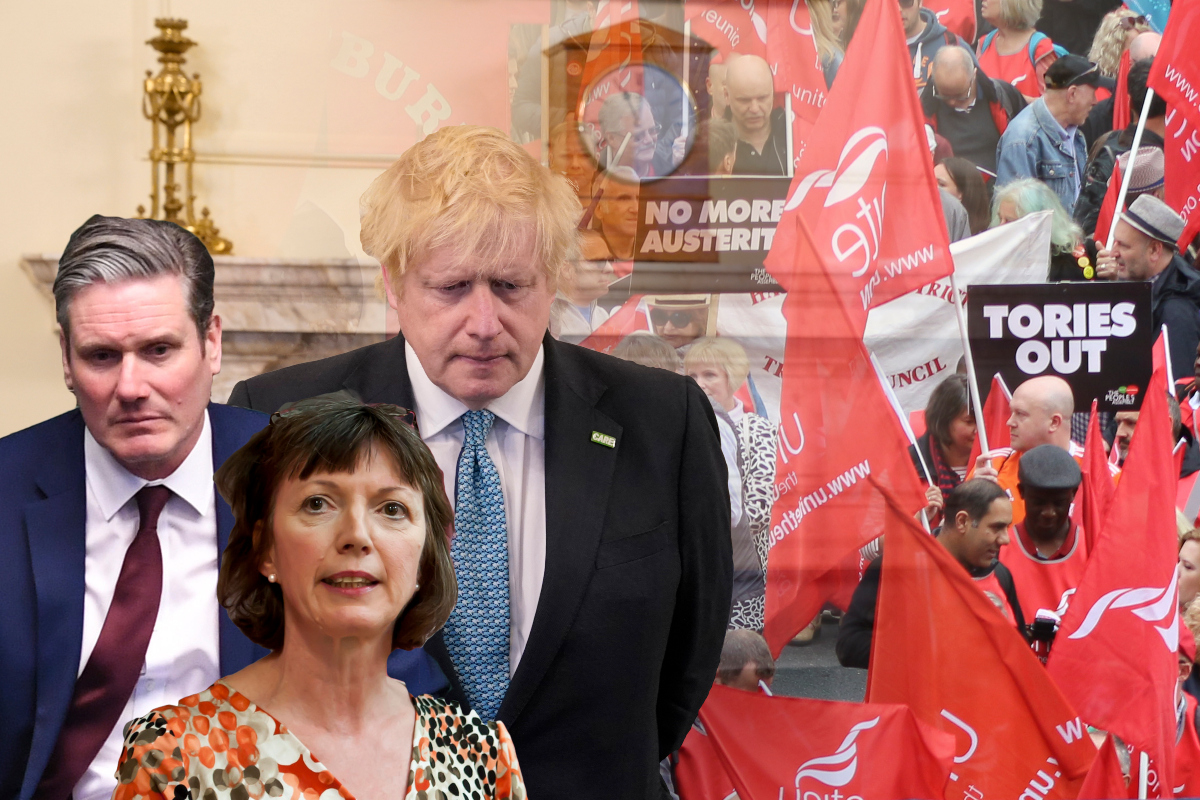Frances O’Grady is set to retire from her role as TUC general secretary. Under her direction, the TUC has been characterised by compromise and cosying up to the bosses. Instead, with workers under attack, the trade unions need militant leadership.
After nine years as TUC general secretary, Frances O’Grady recently announced that she will be stepping down from the position later this year.
O’Grady has received various plaudits from the great and good of the political establishment for her time in office.
Effusive in his praise, Keir Starmer claimed that O’Grady has been a “great champion for working people all her life”. Mirror associate editor Kevin Maguire, meanwhile, commented that she would make “a great Labour MP…or peer”.
These figures clearly see the outgoing TUC leader in a positive light. But what role has O’Grady really played in workers’ struggles?
Keeping quiet
At the time that O’Grady assumed the role in 2013, the working class was already three years into a brutal regime of austerity and cuts.
It soon became clear, however, that her leadership represented “more of the same” in terms of the TUC’s historically passive, timid approach to industrial relations.
O’Grady’s favoured tactic has been to make appeals to the bosses and the Tory government to “be reasonable”, all while limiting the TUC’s actions to the occasional public protest or march. This runs like a thread through her time as general secretary.
From their tepid response to new Tory anti-trade union laws in 2015; to O’Grady’s friendly embrace of the Tories and the CBI (the bosses’ union) during furlough negotiations: the TUC leadership has consistently responded to workers’ problems by standing on the sidelines, offering mild letters of protest, or simply keeping quiet altogether.
New realism
 Like her predecessors, Frances O’Grady prefers to be seen as reasonable and moderate; to be photographed cosying up to the bosses, rather than mobilising workers to take militant action.
Like her predecessors, Frances O’Grady prefers to be seen as reasonable and moderate; to be photographed cosying up to the bosses, rather than mobilising workers to take militant action.
The results of this approach are obvious. Time and time again, her ‘reasonable advice’ has simply been brushed aside by a government committed to defending the bosses’ profits and attacking the working class.
This style of trade unionism, to use its proper name, is class collaboration. But it is not the product of some defect in O’Grady as a person. Nor is this attitude limited to her alone.
At root, it reflects the conservative, diffident outlook of the trade union bureaucracy; the ‘pragmatism’ has traditionally dominated the union leadership since the defeats of the 1980s, and in many other prior periods when the class struggle has been blunted.
O’Grady, in many ways, was a perfect example of this ‘new realist’ leadership.
The times we live in, however, are very different from the heyday of the new realists. The defeats of the past are a distant memory to many of the workers now joining trade unions. Instead, it is class struggle that is on the agenda today.
Rise up
 The election of Sharon Graham in Unite and of the Time for Real Change slate in Unison show that rank-and-file union members are looking for leaderships that will provide action rather than mere words.
The election of Sharon Graham in Unite and of the Time for Real Change slate in Unison show that rank-and-file union members are looking for leaderships that will provide action rather than mere words.
The year is not even halfway through, and already struggles have broken out across a range of sectors. This fighting mood is not going away. In fact, it is getting stronger.
Unions such as the RMT and PCS are showing the way forward with campaigns for national strike action. What is needed is for this mood to be generalised, and for these individual battles to be coordinated into a united struggle to topple the Tory government.
This must go hand-in-hand with a bold socialist programme that genuinely addresses the dire situation facing workers, providing a genuine alternative to capitalist crisis.
Even at the peak of its influence, so-called new realism – as preached and practised by O’Grady and other right-wing union leaders – only ever gained crumbs for the working class.
Today, we are in an era when even crumbs are not forthcoming. Instead, we need fighting unions, with leaderships that are willing to go on the offensive; organise militant, mass action; and demand the whole bakery.
It is time for the trade union movement to rise up and prepare to fight.






